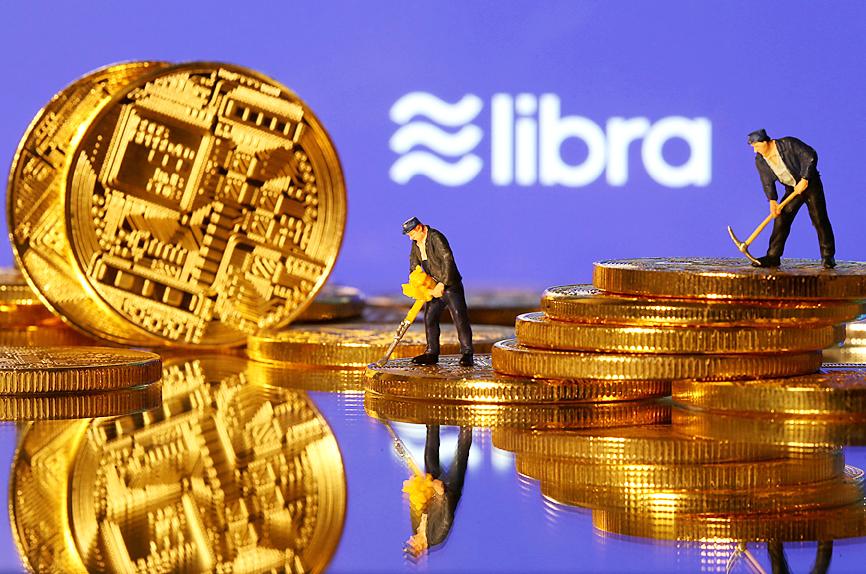Finance ministers and central bankers from G7 economies strongly support the need to regulate digital currencies, the US Department of the Treasury said in a statement on Monday after a virtual meeting.
German Minister of Finance Olaf Scholz issued a sharply worded statement after the meeting, underscoring his concerns about authorizing the launch of Facebook’s Diem stablecoin cryptocurrency in Germany and the EU.
“A wolf in sheep’s clothing is still a wolf,” Scholz said. “It is clear to me that Germany and Europe cannot and will not accept its entry into the market while the regulatory risks are not adequately addressed. We must do everything possible to make sure the currency monopoly remains in the hands of states.”

Photo: Reuters
US Secretary of the Treasury Steven Mnuchin hosted this year’s 12th meeting of G7 finance officials as Washington prepares to hand over the presidency of the G7 to London next month.
The G7 finance officials discussed ongoing responses to “the evolving landscape of crypto assets and other digital assets, and national authorities’ work to prevent their use for malign purposes and illicit activities,” the department said. “There is strong support across the G7 on the need to regulate digital currencies.”
The officials reiterated their support for a G7 joint statement on digital payments in October, which said they could improve access to financial services, and cut inefficiencies and costs, but should be “appropriately supervised and regulated.”
A stablecoin is tied to a traditional currency or basket of assets, and can be used for payments or storing value.
Facebook in June announced plans to launch a digital currency, but regulators fear that it could destabilize the global financial system.

NEW IDENTITY: Known for its software, India has expanded into hardware, with its semiconductor industry growing from US$38bn in 2023 to US$45bn to US$50bn India on Saturday inaugurated its first semiconductor assembly and test facility, a milestone in the government’s push to reduce dependence on foreign chipmakers and stake a claim in a sector dominated by China. Indian Prime Minister Narendra Modi opened US firm Micron Technology Inc’s semiconductor assembly, test and packaging unit in his home state of Gujarat, hailing the “dawn of a new era” for India’s technology ambitions. “When young Indians look back in the future, they will see this decade as the turning point in our tech future,” Modi told the event, which was broadcast on his YouTube channel. The plant would convert

‘SEISMIC SHIFT’: The researcher forecast there would be about 1.1 billion mobile shipments this year, down from 1.26 billion the prior year and erasing years of gains The global smartphone market is expected to contract 12.9 percent this year due to the unprecedented memorychip shortage, marking “a crisis like no other,” researcher International Data Corp (IDC) said. The new forecast, a dramatic revision down from earlier estimates, gives the latest accounting of the ongoing memory crunch that is affecting every corner of the electronics industry. The demand for advanced memory to power artificial intelligence (AI) tasks has drained global supply until well into next year and jeopardizes the business model of many smartphone makers. IDC forecast about 1.1 billion mobile shipments this year, down from 1.26 billion the prior

People stand in a Pokemon store in Tokyo on Thursday. One of the world highest-grossing franchises is celebrated its 30th anniversary yesterday.

Zimbabwe’s ban on raw lithium exports is forcing Chinese miners to rethink their strategy, speeding up plans to process the metal locally instead of shipping it to China’s vast rechargeable battery industry. The country is Africa’s largest lithium producer and has one of the world’s largest reserves, according to the US Geological Survey (USGS). Zimbabwe already banned the export of lithium ore in 2022 and last year announced it would halt exports of lithium concentrates from January next year. However, on Wednesday it imposed the ban with immediate effect, leaving unclear what the lithium mining sector would do in the